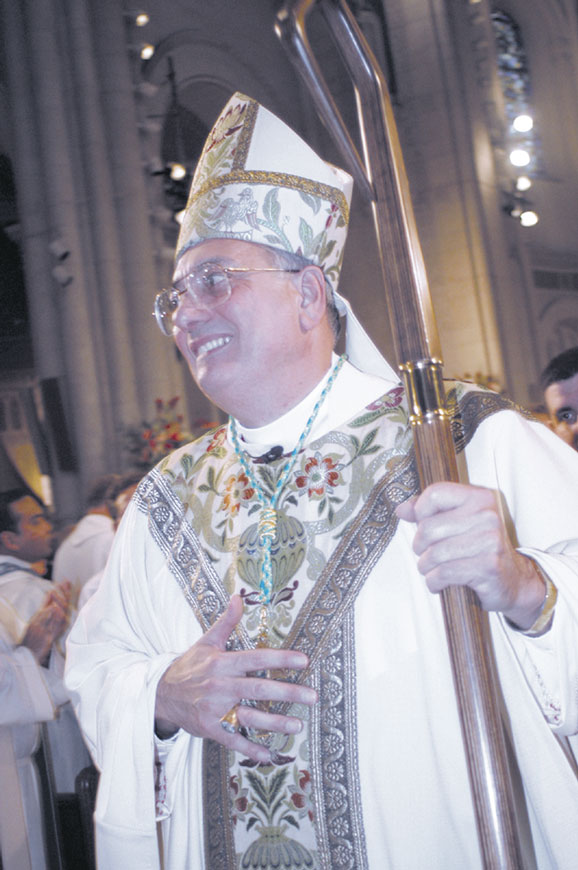
My dear brothers and sisters in the Lord,
It is hard for me to imagine that it is almost 10 years since His Eminence, Edward Cardinal Egan, installed me as the seventh Bishop of Brooklyn. There is great faith in Brooklyn and Queens, and it is contagious. There is also a wealth of human resources and deep bonds of affection to our diocese. One of my great privileges as Bishop is to have so many dedicated and qualified collaborators who make my ministry as Bishop of Brooklyn both fruitful and enjoyable.
We as a diocese faced significant challenges together in the past 10 years. On Oct. 3, 2003, all seemed to agree that the highest priority for me as the new Bishop would be to address the problem of our schools and our parishes which were in crisis. Falling enrollment in the case of schools and declining attendance in the case of some parishes resulted in an unsustainable financial pressure that threatened the entire diocese in Brooklyn and Queens. These challenges, coupled with a critical shortage of young men entering the seminary, were the cause of great concern. Put simply, the future would seem bleak to those without faith. Yet, for those with faith, no obstacle is insurmountable.
Without qualification, I am most grateful for the work of Father Kevin Abels, Father Kevin Sweeney and Lisa Amore in regard to vocations in our diocese. Priestly and religious vocations are a prime indicator of life in the Church. Ten years ago, we had only 27 seminarians, and because of the hard work of our vocations team, we have ordained 45 men and currently have 60 men studying for the priesthood. Priestly and religious vocations are an indication of the future. We must redouble our efforts to make sure that every parish has a vocations committee which encourages young men to prepare for priesthood and service as religious brothers, as well as young women to serve the Church as religious sisters.
Catholic schools are an essential resource for the new evangelization. I am deeply troubled by the rising costs associated with Catholic education. We need to make sure that our Catholic schools are affordable for the working poor and middle class. In the past, religious sisters and brothers bore the burden to make these institutions affordable. Justice demands we ensure that our teachers and administrators are properly paid. Today, we must all come together and assist our families to make the dream of Catholic education possible. This has required some “right sizing” of our institutions. Allow me to take this opportunity to thank all of the administrators and voluntary board members for their dedicated and hard work. Families have fewer children today and so our need for the same number of institutions has changed. We have done the difficult and painful work of bringing our institutions in line with demographic shifts in our communities.
The challenge of the coming years will be to make sure that our schools are truly incubators of faith. We must honestly admit that Catholic grammar schools, high schools and universities can do better in forming young people in the life of faith. My hope is that much of the ground work done these last 10 years to ensure academic excellence and financial stability will enable us to focus on the deeper and actual purpose of these institutions: that our schools help form committed Catholic men and women who labor for Christ and his Church.
With approximately 1.5 million Catholics living in Brooklyn and Queens, it is disappointing to report that only about 250,000 people attend Holy Mass each Sunday. We must do better. Christ established the Church for the purpose of gathering us around the Eucharistic Table. Over the course of the next year, I will be calling upon all of us to discuss ways in which we can help remind people that the great spiritual hunger can only be met at the celebration of the Eucharist on Sunday.
Ten years ago, I spoke about the need to commit ourselves to the New Evangelization. Essentially, that meant we were called to recognize the universal call to holiness. We are all called to be holy – not just our priests, deacons and religious. Likewise, Christ gave to us all the great commission to baptize all nations. During my remaining years as Bishop of Brooklyn, I hope that we have renewed emphasis on that important work. Specifically, I am determined that every parish has a vibrant Rite of Christian Initiation of Adults (RCIA), not just a functioning one.
In Brooklyn and Queens, we believe that there are approximately 144,000 young people in our city public schools who are nominally Catholic. Frankly, it is difficult for me to sleep when I consider that these young people are not being formed in the faith through our RCIA program. This is an injustice that none of us can tolerate and all of us must work to resolve. This year, I will be looking to our Catholic school teachers and religious educators to see how they think we might address this serious deficiency in the life of our diocese so that all of our Catholic children may learn about our faith.
Ours is a unique diocese known throughout the world. From Asia to Europe to Africa to Latin America, every family seems to know someone who lives or lived in Brooklyn. As the diocese of migrants, we will recommit ourselves to the principle that every ministry is reflective and responsive to the needs of the immigrants in our midst.
The people of Brooklyn and Queens are tough-minded; you have to be in order to get by in this city. Ten years ago, we had failing schools, but today each parish is now living within its means. I am grateful to my closest collaborators – my auxiliary bishops, brother priests, deacons and religious – for the many sacrifices each has made in the past. I also challenge us all in the Diocese of Brooklyn to work together, as there is much more we need to accomplish in the future.
As we put out into the deep, let us always recall the words of the psalmist, “Zeal for your house dost consume me, O Lord” (Ps. 69).


